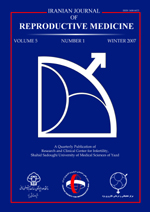
|
International Journal of Reproductive BioMedicine
Research and Clinical Center for Infertility, Shahid Sadoughi University of Medical Sciences of Yazd
ISSN: 1680-6433
EISSN: 1680-6433
Vol. 11, No. 6, 2013, pp. 495-502
|
 Bioline Code: rm13063
Bioline Code: rm13063
Full paper language: English
Document type: Research Article
Document available free of charge
|
|
|
International Journal of Reproductive BioMedicine, Vol. 11, No. 6, 2013, pp. 495-502
| en |
Comparison of pharmacological and nonpharmacological treatment strategies in promotion of infertility self-efficacy scale in infertile women: A randomized controlled trial
Pasha, Hajar; Faramarzi, Mahbobeh; Esmailzadeh, Seddigheh; Kheirkhah, Farzan & Salmalian, Hajar
Abstract
Background: The infertility is associated with psychological consequence including depression, and lack of self-efficacy.
Objective: The aim of this study was to compare the pharmacological and no pharmacological strategies in promotion of self-efficacy of infertile women.
Materials and Methods: A randomized controlled clinical trial was conducted on 89 infertile women who were recruited from Fatemeh Zahra Infertility and Reproductive Health Research Center and were randomized into three groups; cognitive behavioral therapy (CBT), antidepressant therapy with flouxetine 20 mg daily for 3 month, and a control group. All participants completed Infertility Self-efficacy Inventory (ISE) and the Beck Depression Inventory (BDI) at the beginning and end of the study.
Results: The means ISE scores among the CBT, fluoxetine, and control groups at the beginning and end of the study were 6.1±1.6 vs. 7.2±0.9, 6.4±1.4 vs. 6.9±1.3 and 6.1±1.1 vs. 5.9±1.4 respectively. Both CBT and fluoxetine increased the mean of ISE scores more than control group after intervention (p<0.0001, p=0.033; respectively), but increase in the CBT group was significantly greater than flouxetine group. Finally, there was evidence of high infertility self-efficacy for women exposed to the intervention compared with those in the control group. Also, there was an improvement in depression. Both fluoxetine and CBT decreased significantly the mean of BDI scores more than the control group; decrease in the CBT group was significantly more than that in the fluoxetine group.
Conclusion: CBT can serve as an effective psychosocial intervention for promoting self-efficacy of infertile women.
Keywords
Infertility; Self-efficacy; Cognitive behavioral therapy; Psychotherapy; Drug therapy
|
| |
© Iranian Journal of Reproductive Medicine
Alternative site location: http://www.ijrm.ir
|
|
